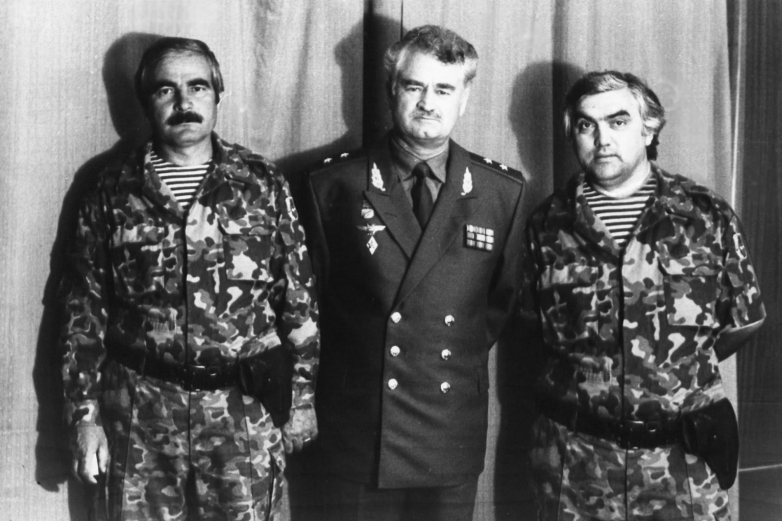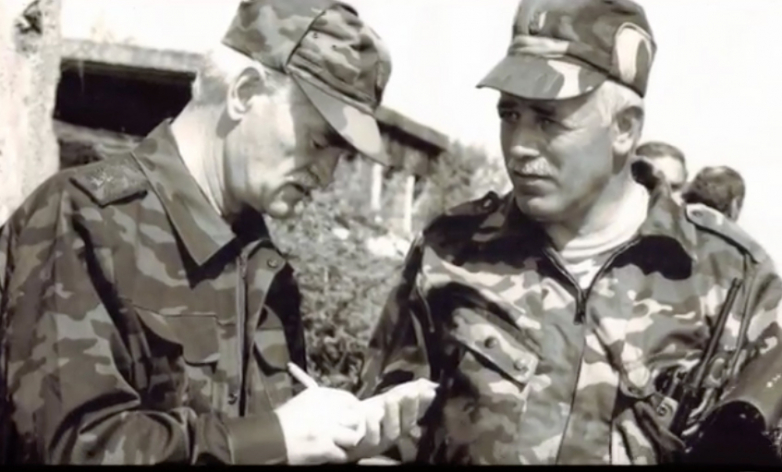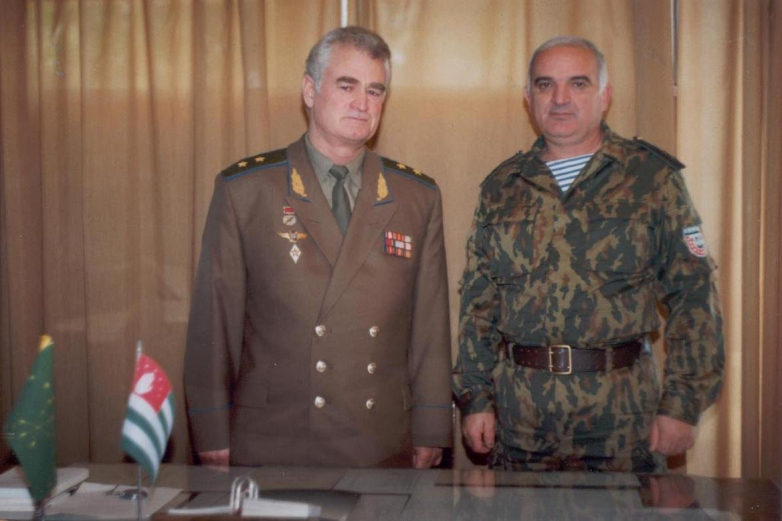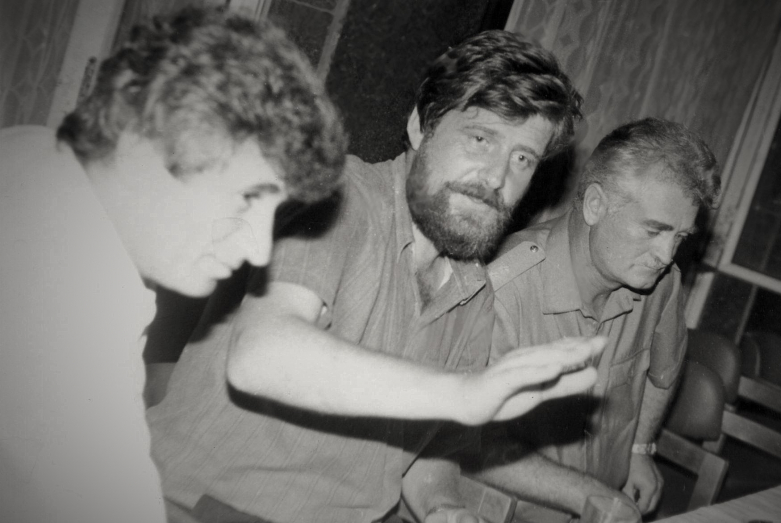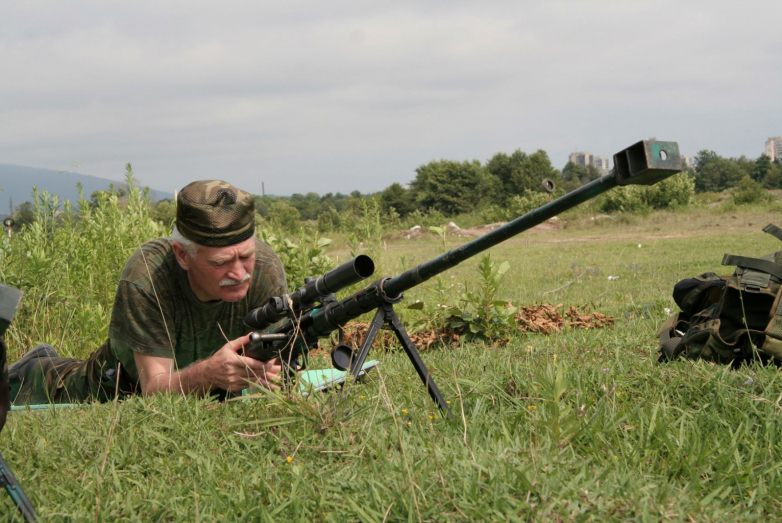Sultan Sosnaliev (1942-2008): First Commander of the Mountain Peoples of the Caucasus
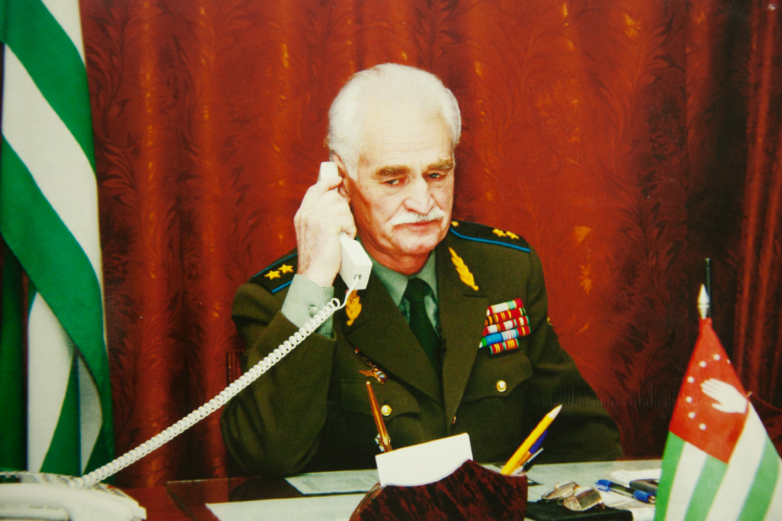
Sultan Sosnaliev (1942-2008)
Sultan Aslambekovich Sosnaliyev (23 April 1942 – 22 November 2008) was a Soviet Army officer of Circassian [Kabardian] ethnicity who served as a commander of Abkhaz and North Caucasus forces during the (1992-93) Georgian-Abkhaz war and as the defence minister of the Republic of Abkhazia in 1993–1996 and 2005–2007.
Sultan Sosnaliyev was born in Baksan, in the Russian North Caucasus republic of Kabardino-Balkaria to Kabardian parents. He graduated from the Syzran Higher Military Aviation School and from the Zhukov Air and Space Defense Academy and served in the Soviet anti-aircraft forces for 29 years. He retired in 1990 in the rank of a colonel and worked in Kabardino-Balkaria's construction industry till 1992.
Sosnaliyev became the head of the military department of the newly formed Confederation of Mountain Peoples of the Caucasus. After the beginning of the War in Abkhazia he arrived to Abkhazia with the group of Circassian (Kabardian) volunteers through on 15 August 1992. He was appointed the head of the staff of the Gudauta-based State Committee of the Defence and was one of the planners of the victorious Battle of Gagra.
He was appointed the minister of defence in April 1993 and later awarded the rank of Major General. It was he who became a strategist who developed the famous September offensive, which brought victory to Abkhazia and put an end to the bloody war.
Sosnaliev resigned in July 1996 and returned to Kabardino-Balkaria. After Sergey Bagapsh had been elected the President of Abkhazia he offered the office of the minister of defence to Sosnaliev in the Abkhazian army. The latter agreed and served in the Abkhazian government as a minister of defence and a vice-premier till May 2007.
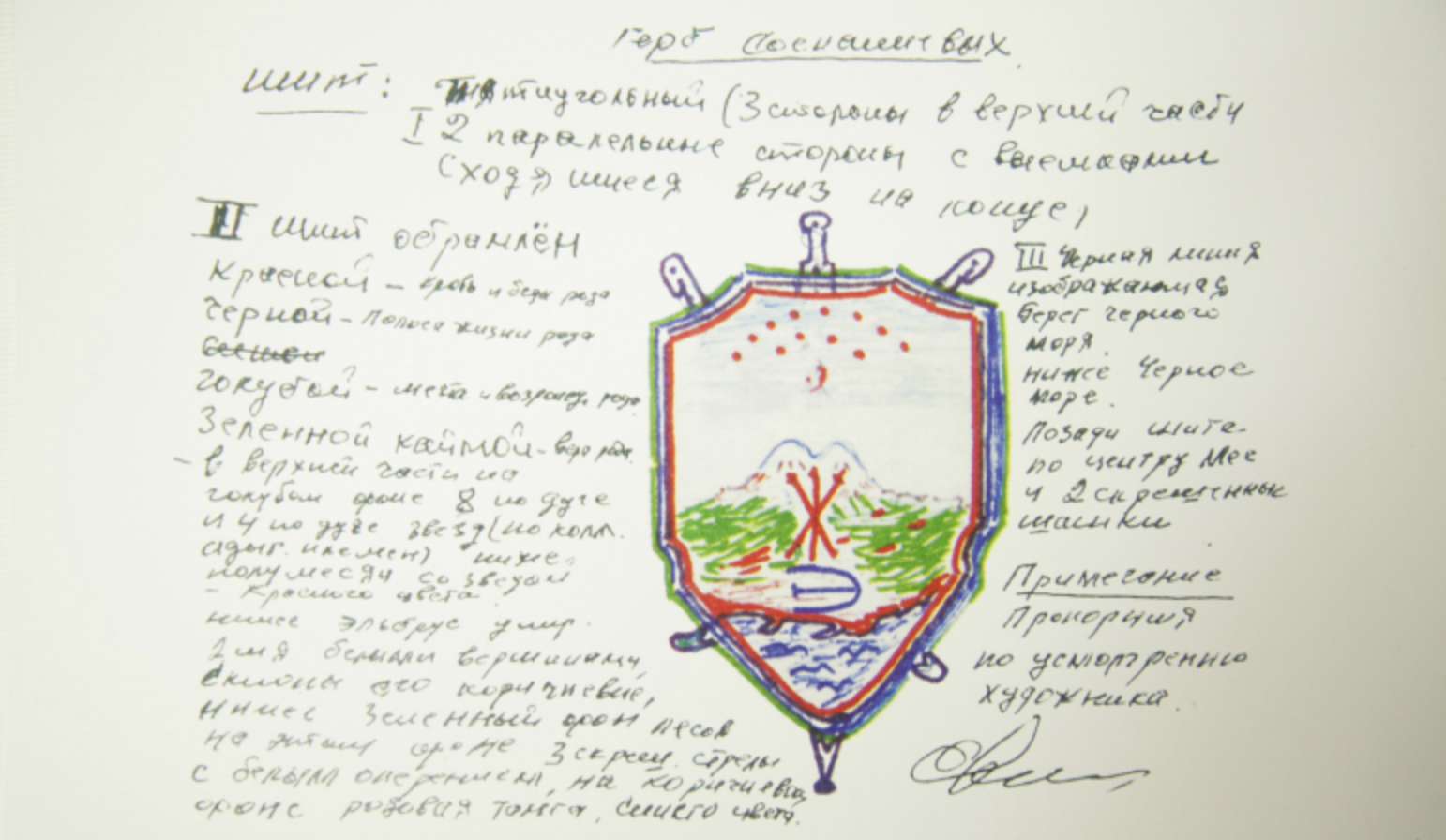
Autograph of Sultan Sosnaliev with a description of the coat of arms of the Sosnaliev family developed by him
Hero from an early age
Sultan Sosnaliev was descended from the old Kabardian princely family of the Sosnalievs, their last name was also pronounced as Tlostanaliev and Susnaliev. After the revolution of 1917 in Russia, his ancestors were persecuted and repressed because of their noble origin. This fate was not avoided by the father of Sultan Aslambek, who, however, was rehabilitated and during the Great Patriotic War he was drafted into the Soviet army and fought at the front.
Sultan Sosnaliev was born on April 23, 1942 in the village of Vinogradnoye, which was then part of the Kabardino-Balkarian Autonomous Soviet Socialist Republic, and after 1953 it became part of the Mozdok district of the North Ossetian Autonomous Soviet Socialist Republic. The mother of Sultan Tauzhan Anzorova brought up two sons: Sultan and his younger brother Anatoly. According to childhood friends, Sultan from the earliest years possessed such qualities as courage and willingness to protect the weak. For example, a fellow villager of Sultan Aslambekovich Murtaz Umov recalled how once Sultan rescued two sinking boys from a stormy river Terek, risking his own life.
+ A book about Hero of Abkhazia Sultan Sosnaliev has been launched in Sukhum
+ A memorial evening for Sultan Sosnaliev held in Nalchik
+ Presentation of the Ekaterine Bebia's Books "Our general SULTAN SOSNALIEV" and "Select Ones''
“Tested everything that a pilot must test”
After graduation, Sultan Sosnaliev decides to link his fate with military service. He enters the Syzran Higher Military Aviation School for Pilots. The first flight with an instructor was unexpected for the young man.
This is how Sosnaliev himself describes it in his memoirs: “My head dangles, the sky, the earth, the sky, the earth jump in front of my eyes, and i think why do I need all this? .. I landed, and I answered, having collected all my courage to the question if I like it - “very much.” He patted my shoulder knowingly and said that “a time will come when you will not be able to live without flying.”
So it happened: in the school Sultan Sosnaliev became one of the best. After graduation, he went from a simple pilot to a regiment commander. In one of his interviews, Sosnaliev noted: “I fully mastered and made everything related to aviation. I made more than 500 jumps from an airplane. I have tested everything that a fighter pilot must test. I was in the most critical situations, on the verge of life and death, from which I came out by the will of fate, luck, and professionalism.”
In 1978 he graduated from the Marshal of the Soviet Union Georgy Zhukov Military Red Banner Academy of Air Defense. In 1989, Sosnaliev resigned from the USSR Armed Forces with the rank of Honored Military Pilot of the USSR. It should be noted that he is the only Circassian awarded this rank for the entire Soviet period.
By the time of the beginning of the Patriotic War of the people of Abkhazia, Sosnaliev was already fifty years old, he worked as deputy general director of “Kabbalkgrazhdanstroy” (construction company in Kabardino-Balkaria).
As a person who headed the military department in the newly created Confederation of Mountain Peoples of the Caucasus, he, of course, understood that the situation in Abkhazia was approaching an open armed conflict. Even before the outbreak of hostilities, he had been in Abkhazia, personally met Vladislav Ardzinba, and even traveled to the Ingur river bordering with Georgia in order to personally, as a military professional, assess whether there is any preparation from the Georgian side.
The findings were disappointing. In one of his interviews, Sosnaliev said: “After numerous meetings with the leadership of Abkhazia, an analysis of current events, especially after a trip to Ingur, my worst assumptions were confirmed: the Georgian State Council to solve its political goals, namely the abolition of the Abkhaz autonomy, deprivation of the Abkhaz people’s language and culture and its full assimilation, was ready to use military force ...”.
Sultan Aslambekovich's wife, Lyubov Sosnalieva, recalls that on August 14, the day the war broke out in Abkhazia, Sosnaliev came home very late, quickly had dinner, collected things, grabbed a leather flight jacket, and with the words “I’ll just go and find out what is going on there,” left. The fact that Sultan was in Abkhazia, in the crucible of the war, and already appointed head of the headquarters of the national militia, was reported to his wife by relatives who heard the news on the radio.
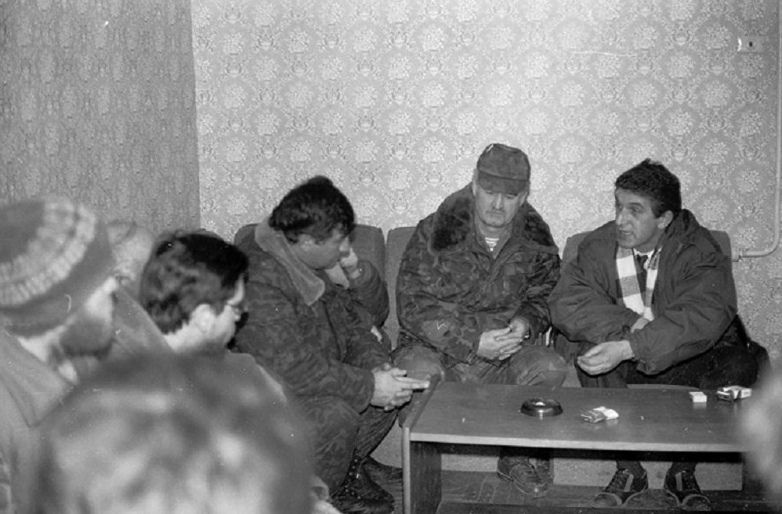
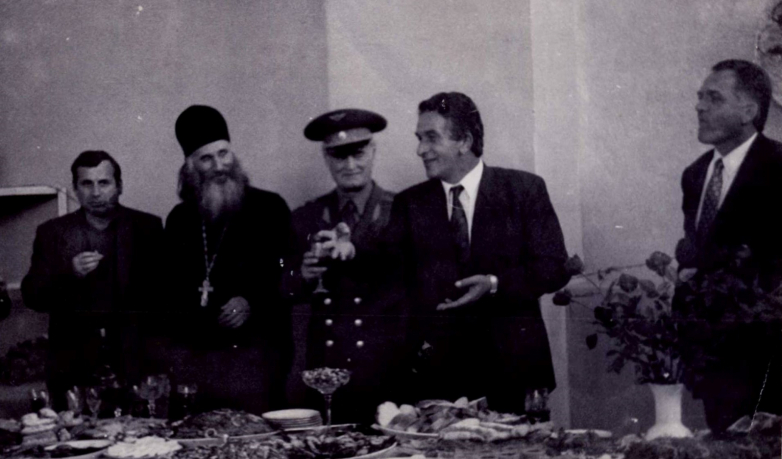
By some miracle, breaking through the enemy cordons — that is, driving across the Psou and Gagra, which was in the hands of the Georgian militia — already on August 15, 1992, Sultan Sosnaliev with a group of volunteers from the North Caucasus was in the Gudauta headquarters, side by side with their Abkhaz comrades. Later in an interview, Sosnaliev will say: “Conscience called me to Abkhazia”.
Sultan Sosnaliev found himself in Abkhazia not only because it required the help and knowledge of professional military men, but, first of all, because he “felt the call of blood”. The poet, public figure Gennady Alamia is confident about it. He recalls how, at their very first meeting in the city of Grozny, Sosnaliyev told him: “From the height of the Caucasus Kabarda and Abkhazia are united, no boundaries can be seen.”
Professionalism, brilliant knowledge and cold-blooded self-possession of Sultan Sosnaliev have played, without exaggeration, a huge role in the whole course of the war.
+ Sultan Sosnaliev: First Commander of the Mountain Peoples of the Caucasus, by Musa Shanibov
+ How nations united: Formation of the Confederation of Caucasian Peoples
+ The capture of Sukhum: the main battles for the liberation of the capital
Confident voice of the “Twelfth”
Those who have ever heard his voice on the military radio talk eloquently about the legendary tranquility of Sultan Sosnaliev. “The Twelfth” - namely, this was Sultan Sosnaliev’s call sign - he always spoke precisely, always on business, without tension and panic.
He especially did not tolerate panic, realising that in war it was the worst of all. This is quite eloquently told by the hero of Abkhazia, Garry Samanba. At the very beginning of the war, he was alarmed by rumors that an enemy sabotage was being prepared near his native village, came and reported to Sosnaliev, but he didn’t even flinch, but only said: if I didn’t see it myself, it means panic. In the article “He taught us to fight,” Samanba writes: “Sultan Aslambekovich could wisely and tactfully, when discussing upcoming offensive operations, explain to us, the commanders, what to do for a successful (and with minimal losses) outcome of the offensive.”
Sultan Sosnaliev was one of the few military personnel who were then on the side of the Abkhaz militia. Next to him were not so many professionals. First of all, it is a brilliant military specialist, the hero of Abkhazia, General Sergey Dbar, and also the hero of Abkhazia, Major General Vladimir Arshba. The latter pointed out in his memoirs: “Together we could already speak in a professional (military) language, develop plans for military operations and at the same time create an army, which subsequently surprised the whole world with its organisation and bravery”.
The first significant victory in the war was the liberation of Gagra. “In drawing up the plan for this operation, Sosnaliev, as chief of the General Staff, revealed not only outstanding military and organisational skills, but also knowledge of the psychology of people of different nationalities going on the offensive. In conditions when volunteer detachments were formed along ethnic lines, this was of great importance,” writes Vladimir Arshba.
Head of the General Staff Sosnaliev was appointed back in October 1992, immediately after the establishment of the Ministry of Defense of Abkhazia, he was also Deputy Minister of Defense Vladimir Arshba. In April 1993, when Vladimir Arshba had to leave for treatment due to his injuries and several contusions, Sultan Sosnaliev was appointed Acting Minister. As Arshba himself notes, there were proposals to appoint Sosnaliev as minister at once, but he remained acting until Arshba returned to the front on crutches and did himself give the Commander a resignation report.
“And so - in everything,” recalled Vladimir Arshba about this incident. “Never, under any circumstances, has Sultan betrayed himself, remaining a knight without fear and reproach.”
Sosnaliev headed the defense department of the warring Abkhazia in one of the most difficult periods: the March operation was unsuccessful, the Abkhaz side suffered huge losses. The mood at the front and in the rear was the most woeful. According to the testimony of a participant in those events, at that time, the first deputy minister of defense, Guram Dopua, closer to the summer, Sultan Sosnaliev “literally lured Sergey Platonovich Dbar out of the Gumista front to the General Staff.” Together they began to develop the July offensive operation to liberate the town of Sukhum. This is how strategist Sultan Sosnaliev and tactician Sergey Dbar joined their brains and bent over the table on which the map of Abkhazia was laid out.
This is how Dopua recalls these days: “A small room with a sofa adjoined the headquarters. They brought a small table. And at this table, sitting on the sofa, Sergey Dbar developed a plan for the July operation during the week. After Sultan made adjustments, he returned maps, carefully folded pencils, special tools for working with maps, and immediately went back to the front.”
The July operation was also unsuccessful, but it brought significant results, which served as a support for the new offensive operation. According to Dopua, it was as a result of the July operation on the left bank of the Gumista the springboard for the new offensive was secured. The command and control of the troops reached a high level of efficiency. In addition, it was after July that Sultan Sosnaliev made the decision to transfer the headquarters from the town to the neighborhood. A seemingly insignificant decision was in fact connected with a rigid system of restricting access to headquarters.
Victorious September
On September 16, the decisive offensive of the Abkhaz troops began simultaneously on both fronts: Gumista and East. This operation was developed by Sosnaliev, Dbar and all top military leaders literally to the smallest detail. The actions of all the commanders were agreed, all past mistakes were taken into account, and all intelligence reports were considered. The skillful actions of General Sosnaliev under the command of the troops that stormed Sukhum led to the liberation of the town from the Georgian invaders on September 27, 1993. Two days later, the Gumista (Western) and Eastern Fronts were reunited, which together moved to the state border of Abkhazia, the Ingur River (official border with Georgia).
Arriving personally at Ingur, Sultan Aslambekovich gathered a bottle of river water. Later, Sosnaliev will hand it over to Vladislav G. Ardzinba as a unique symbol of the fact that the territory of Abkhazia from the Psou River to the Ingur River was finally liberated from the enemy. Sultan Sosnaliev was able to do this together with the entire Abkhaz army, which he created with such difficulty.
After the war, Sultan Sosnaliev for some time headed the Ministry of Defense. He conducted a successful operation to liberate the high-mountain village of Lata, where Georgian troops still remained.
In 1996, Sultan Sosnaliev left his military career, seemingly forever. He went to the reserve for a long time and lived in Nalchik — until 2005 when the second President of Abkhazia, Sergey Bagapsh asked him to take the place of the Minister of Defense of the Republic again. Sultan Aslambekovich accepted the offer. He held this post until 2007, and then returned to his native Kabarda.
The hero of Abkhazia, Lieutenant-General of the Armed Forces of the Republic of Abkhazia, holder of the highest state award First Degree “Honor and Glory”, the glorious son of Abkhazia and Kabarda Sultan Sosnaliev died in November 2008. His bust today stands in the center of Sukhum in the Park of Military Glory, in the same place where the defenders of the homeland are buried, next to the monument to his comrade General Sergey Dbar.
